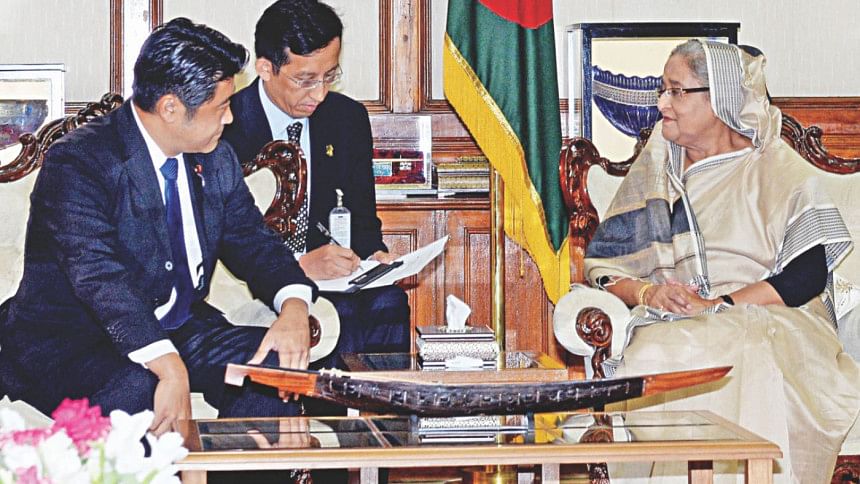Japan, Italy send in top officials

Outraged at the killing of their citizens, Japan and Italy have sent high officials, counter-terrorism intelligence experts, response teams and victims' family members to Dhaka on special aircrafts.
Senior Vice Foreign Minister Seiji Kihara of Japan arrived in the capital on Saturday night. Yesterday, he had meetings with top government officials, including the prime minister. He along with embassy officials visited the attack spot and the hospital where the victims' bodies have been kept.
A special aircraft from Rome touched down at Shahjalal International Airport at 9:30am yesterday, carrying a five-member high profile Italian delegation.
The team would meet high government officials, visit the spot in Gulshan diplomatic zone and take back the bodies of nine Italian citizens who were killed in the attack on Holey Artisan Bakery in the city on Friday.
An Air Self-Defense Force jet of Japan arrived in Dhaka last night carrying 18 relatives of the victims, members of the International Counter-Terrorism Intelligence Collection Unit, emergency response team of the foreign ministry, members of the Consular Affairs Bureau of Japan International Cooperation Agency (Jica), press relations experts and medical officers.
Meanwhile, Japanese Prime Minister Shinzo Abe yesterday expressed anger at the terrorist attack in Dhaka that claimed the lives of seven Japanese volunteers working on a government development project.
Italian Prime Minister Matteo Renzi said, “Confronted with the madness of those who want to undo the Italian way of life, Italians have been struck but not broken.”
An Indian diplomat said his country was also quite concerned about Friday's attack as no such terrorist attack took place in Bangladesh before. India is extremely pained to share that the terrorists killed 19-year-old Tarishi Jain, who was taken hostage during the attack, he added.
The killing of nine Italian, seven Japanese, one Indian and a US citizen has raised concern among foreign governments about the danger of violent attacks on their citizens in Bangladesh. The incident also sparked a debate over whether the Islamic State or other radical Islamist groups were behind such attacks.
Diplomatic sources said the Italian and Japanese people were deeply shocked and saddened by the loss of lives in Bangladesh. The foreign victims wanted to work and help the socio-economic development of Bangladesh.
They said two innocent people -- Italian Cesare Tavella and Japanese Kunio Hoshi -- were killed in Bangladesh last year. Tavella was the local project manager of a Netherlands-based global development agency and Hoshi was working on advanced farming techniques.
Talking to The Daily Star yesterday, Bangladeshi diplomats in Rome and Tokyo missions said government officials and many citizens of those countries asked them whether their nationals were at all safe in Bangladesh.
The seven Japanese were part of a group of eight people working with Jica to ease the heavy traffic in Dhaka, a city of around 1.5 crore people.
“Engineers who strived for the development of Bangladesh were involved in the incident, and I feel strong resentment,” Jica chief Shinichi Kitaoka said in Tokyo yesterday.
They were identified through photographs and belongings, said Chief Cabinet Secretary Yoshihide Suga.
The eighth person in the Jica group is Tamaoki Watanabe, an Almec employee. He was rescued after being shot in the face.
Sources said officials from the Japanese embassy in Dhaka talked to Watanabe at the hospital where he has been undergoing treatment. His injuries were said to be not life-threatening.
The Japanese have been increasingly becoming concerned as their citizens are falling victims to terrorist attacks in different parts of the world. As a result, the Japanese government is under pressure at home for ensuring safety of Japanese citizens abroad, according to diplomatic sources.
Since 2001, a good number of Japanese citizens became victims of major terrorist attacks. Over 50 Japanese were killed, including 24 in the al-Qaeda terrorist attack on twin towers in New York on September 11, 2001, 10 in Algeria in January 2013 and the latest seven in Bangladesh. Japanese citizens were also killed in Indonesia, India, Iraq and Tunisia.
“We intend to continue to take all possible preparations to ensure the safety of Japanese citizens both at home and abroad…we intend to work in cooperation with the international community in order to root out terrorism,” Japanese PM Shinzo Abe said yesterday.

 For all latest news, follow The Daily Star's Google News channel.
For all latest news, follow The Daily Star's Google News channel. 



Comments